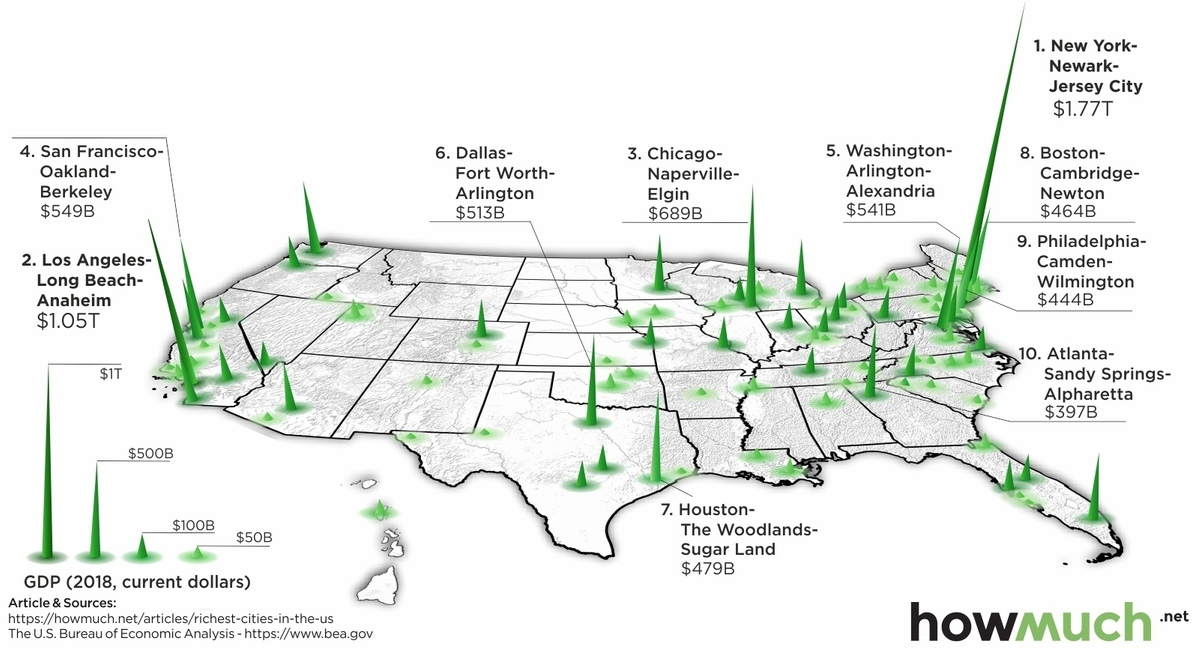Houston’s Economic and Geographic Size, and Its Supportive and Resilient People
A lot of smaller items to catch up on this week:
- 3D Map: The U.S. Cities With the Highest Economic Output. Houston at #7 is not bad, although I’ve seen it higher when oil is up. We’re #5 population but SF tech and DC govt move their GDP ahead (your tax $ at work). The Texas economy is equal to Canada.

On to other items:
- Affordable housing tops a neoliberal agenda for the 2020s:
“So the three policies I propose to define the “neoliberal agenda” for the 2020s are YIMBYism (support for more housing), support for more immigration, and support for a carbon tax… A “neoliberal agenda” focused on these things would be a club, not a party: you can be a neoliberal Republican, a neoliberal Labourite, a neoliberal priest, a neoliberal Green, or whatever. There are loads of other issues that I think are incredibly important that don’t fit here, but these three policy priorities would get you a huge amount of the potential economic and social progress we can make with public policy besides those. Not only are these, in my view, the core of what modern neoliberals really do care about, they are some of the most powerful of all possible policies we could enact to improve the lives of people around the world.”
- Bloomberg: Why New York’s in a Depression and Texas Isn’t
- Houston Lacks Zoning—Or Does It? The State Supreme Court Will Decide – A lawsuit argues that Houston’s Historic Preservation Ordinance is a form of de facto land use control, equivalent to zoning, which isn’t allowed by state and local laws.
- Random interesting trivia: everybody touts how big Houston is at 600 sq.miles, but we’re absolutely dwarfed by Sitka and Juneau Alaska at over 2,700 sq.miles each!
- SFGate: Not so fast, urban exodus: Coronavirus could make New York and San Francisco great places to live again. I agree that eventually rents will fall and there will be a healthy rebalancing, but it ignores transit risk as well what devastated budgets will do to these cities’ services (inc transit) and quality of life.
- Antiplanner: Transit Not Yet Safe to Ride. Excerpt:
“a recent study by epidemiologists from Johns Hopkins University has concluded that, even after “adjusting for social distancing,” “public transit use . . . remained significantly associated with SARS-CoV-2 infection.” The study found that “NPIs” (non-pharmaceutical interventions, e.g., masks & social distancing) “while visiting indoor and outdoor venues helps reduce SARS-CoV-2 transmission.” However, the two exceptions were public transport and places of worship. “Even NPIs may not be possible or sufficient” to prevent the virus’ spread on public transit, the study concludes.”
Video: This is how we Houston after the storm. Love this! We may be susceptible to crazy weather, but we have an incredibly supportive and resilient culture. Hat tip to George.
This piece first appeared on Houston Strategies Blogspot.
Tory Gattis is a Founding Senior Fellow with the Center for Opportunity Urbanism and co-authored the original study with noted urbanist Joel Kotkin and others, creating a city philosophy around upward social mobility for all citizens as an alternative to the popular smart growth, new urbanism, and creative class movements. He is also an editor of the Houston Strategies blog.








